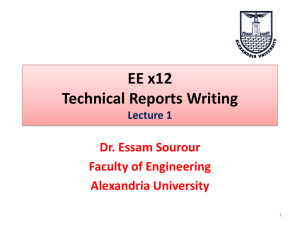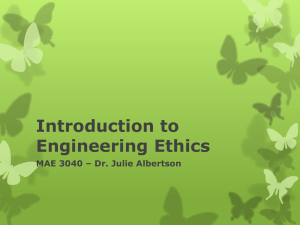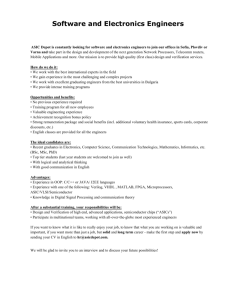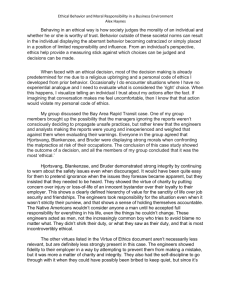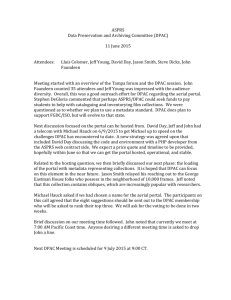Summary of verbal presentation to DPAC – Michael Seager 27JUL15
advertisement
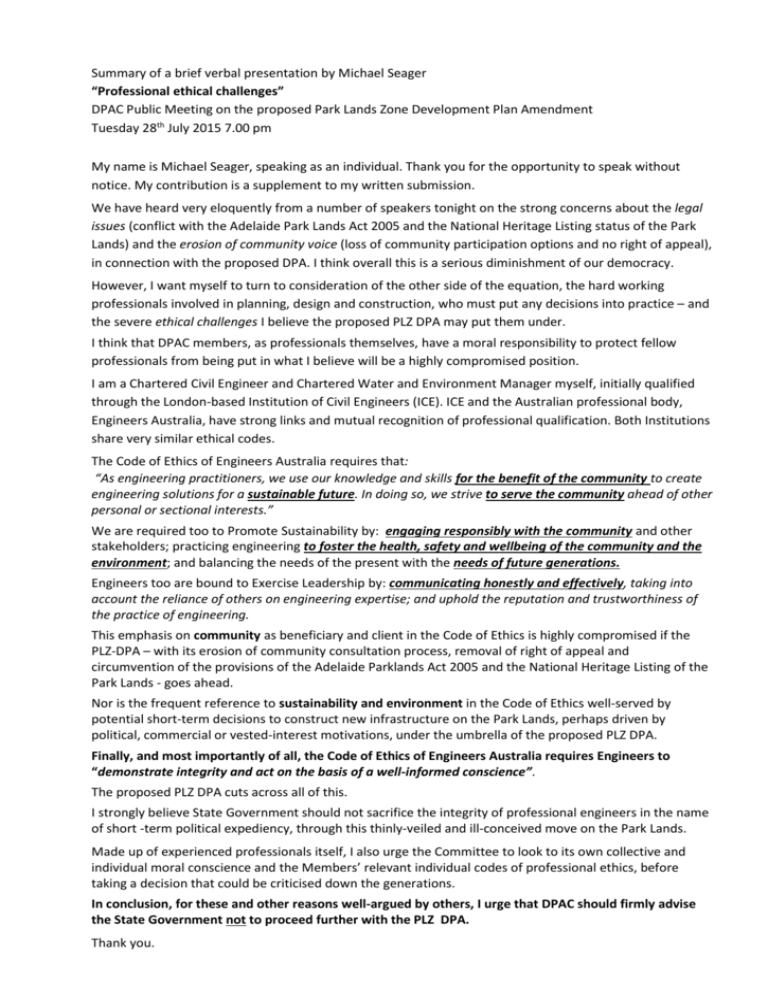
Summary of a brief verbal presentation by Michael Seager “Professional ethical challenges” DPAC Public Meeting on the proposed Park Lands Zone Development Plan Amendment Tuesday 28th July 2015 7.00 pm My name is Michael Seager, speaking as an individual. Thank you for the opportunity to speak without notice. My contribution is a supplement to my written submission. We have heard very eloquently from a number of speakers tonight on the strong concerns about the legal issues (conflict with the Adelaide Park Lands Act 2005 and the National Heritage Listing status of the Park Lands) and the erosion of community voice (loss of community participation options and no right of appeal), in connection with the proposed DPA. I think overall this is a serious diminishment of our democracy. However, I want myself to turn to consideration of the other side of the equation, the hard working professionals involved in planning, design and construction, who must put any decisions into practice – and the severe ethical challenges I believe the proposed PLZ DPA may put them under. I think that DPAC members, as professionals themselves, have a moral responsibility to protect fellow professionals from being put in what I believe will be a highly compromised position. I am a Chartered Civil Engineer and Chartered Water and Environment Manager myself, initially qualified through the London-based Institution of Civil Engineers (ICE). ICE and the Australian professional body, Engineers Australia, have strong links and mutual recognition of professional qualification. Both Institutions share very similar ethical codes. The Code of Ethics of Engineers Australia requires that: “As engineering practitioners, we use our knowledge and skills for the benefit of the community to create engineering solutions for a sustainable future. In doing so, we strive to serve the community ahead of other personal or sectional interests.” We are required too to Promote Sustainability by: engaging responsibly with the community and other stakeholders; practicing engineering to foster the health, safety and wellbeing of the community and the environment; and balancing the needs of the present with the needs of future generations. Engineers too are bound to Exercise Leadership by: communicating honestly and effectively, taking into account the reliance of others on engineering expertise; and uphold the reputation and trustworthiness of the practice of engineering. This emphasis on community as beneficiary and client in the Code of Ethics is highly compromised if the PLZ-DPA – with its erosion of community consultation process, removal of right of appeal and circumvention of the provisions of the Adelaide Parklands Act 2005 and the National Heritage Listing of the Park Lands - goes ahead. Nor is the frequent reference to sustainability and environment in the Code of Ethics well-served by potential short-term decisions to construct new infrastructure on the Park Lands, perhaps driven by political, commercial or vested-interest motivations, under the umbrella of the proposed PLZ DPA. Finally, and most importantly of all, the Code of Ethics of Engineers Australia requires Engineers to “demonstrate integrity and act on the basis of a well-informed conscience”. The proposed PLZ DPA cuts across all of this. I strongly believe State Government should not sacrifice the integrity of professional engineers in the name of short -term political expediency, through this thinly-veiled and ill-conceived move on the Park Lands. Made up of experienced professionals itself, I also urge the Committee to look to its own collective and individual moral conscience and the Members’ relevant individual codes of professional ethics, before taking a decision that could be criticised down the generations. In conclusion, for these and other reasons well-argued by others, I urge that DPAC should firmly advise the State Government not to proceed further with the PLZ DPA. Thank you.

